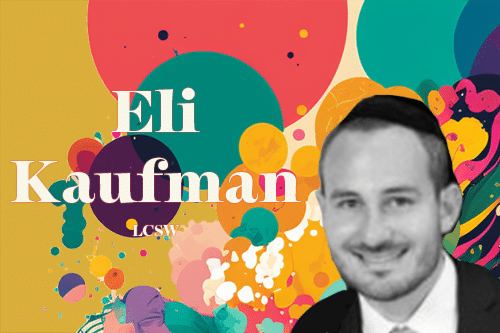Eli Kaufman is a clinical social worker, and therapist, well known in New Jersey for his experience in EMDR, DBT, and psychodynamic therapy. I had the opportunity to pick his brain in an article titled “When a Therapist Cries” in which he shared a well-balanced and thought-out opinion. Meet Eli.
What made you want to work in mental health?
I felt a strong desire to help people. I used to mentor kids struggling with mental health and addictions. I saw their pain and wanted to help in a meaningful way.
What is your favorite part of working in mental health?
I enjoy all of it. But helping people is the main drive.
Can you share a memorable experience or success story from your work with a client?
Thank God there are lots of them. I won’t go into too many details but I’m thinking of a couple of specific cases. The ones that I would say I get the most satisfaction from, to a certain degree is when you have certain clients who come in who are completely hijacked by their traumas, by their fears, they’re completely locked up. Recently I was working with someone who came in and shut down. They had a series of traumatic episodes, a few of them, over their high school experience and post-high school. They went into a complete deep depression, just sat in bed, did nothing, and refused to engage in life. Working with that person, really peeling off the layers and getting to the trauma, doing EMDR, and watching this person transform completely, is beautiful. They were able to get a job, get back out, they’re social. They got a sense of aliveness back in their life. It’s beautiful to watch and I’m grateful to be a part of those experiences.
How do you continue to educate yourself and stay up-to-date in the field of therapy?
Constantly learning. Supervision is important. I’m also doing training. There is a state-mandated amount of credits you must take which requires you to take classes and keep up with new developments in the field.
How do you measure progress in therapy, and how do you involve clients in setting and working towards therapeutic goals?
I would say that this is done throughout. This is a collaborative approach that I take from the very beginning with all my clients. I’m asking questions, beginning with what are your goals. The question I most often ask is if this therapy is successful, and in a few months you’re going to leave here and you’re going to be satisfied that what you came for was accomplished, what would be different in your life? What does that action look like, try to quantify it. Does it mean my relationship with my spouse will be better, would it mean I won’t have panic attacks anymore, get up in the morning and go to work, walk into a room and make conversation? Whatever the client’s goals are I like to have an idea of what the client would like to change in their life. And then I’m trying to meet those goals throughout our work. And then throughout our therapy, I’m trying to measure it. Are you getting closer to reaching those goals? Some goals are not so clear, they’re more vague. I want self-esteem, I want to feel better so then we’re tuning in. I’m looking for signs on my own also, are they more comfortable in the room? Are they showing more emotion, or are they acting through more parts of the self? Are they shifting, does their dynamic change according to what’s happening in the room? So I’m measuring those on my own, but ultimately it’s collaborative with the client if they’re meeting their goals. And I’m always checking in with the client, throughout therapy, to make sure we’re moving in the right direction. And when I feel they’ve met certain goals, I’m also going to check in and say, hey, you came here for this, I see you got here, where do you feel you’re at, what do we have to adjust? And the same thing with ending therapy. My goal with my clients is to have them leave. Some clients don’t like to hear that and some do. In my mind I’m here to help, therapy is not a forever thing. Some clients wish it would be and some clients stay much longer than they need to. I won’t kick clients out but we need to be clear about what we’re doing, what our expectations are, where we’re going with this, is this helpful or not.
Do you ever cry along with a patient? If so, would you be willing to share the circumstances?
There’s a lot of debate about that in the therapy world when you should cry with clients when you shouldn’t. My experience has been, I usually don’t cry with clients. That’s not to mean I don’t feel like crying, I often do feel like crying. Occasionally that’s clear, my eyes may water up. But I try never to really cry. And my reason for that is that the clients are coming into the room. They want to be held, they’re coming because I’m a professional. They want me to feel for them, they want me to empathize with them, they want me to be real with them. But they also want to be held. I don’t want my clients to hold my stuff. They’re triggering in me a deep sadness and that’s real and I’m going to feel it. But it’s not on them to hold it. If I want to cry or over-cry, that means they have to hold and support me. Whether actually [crying] or even if there’s an implicit message here, that’s not fair to the client. We’re not on even terms here, clients come to us to be held. I’ve had many occasions where a client will come and share an awful story. I remember distinctly many years ago when I first started, he told me the story of his whole life and it triggered deep parts in me. And I held it together in that room but I felt like crying. And as soon as he walked out of the room I burst into tears, sobbing uncontrollably. That was actually a catalyst for me going into a new therapeutic experience myself, which led to very valuable work for myself that I had triggered inside myself. But that’s my stuff, not for him to say. It doesn’t mean you have to be cold either, we really feel, so acting like that comes with the business, part of the process of being professionals is to be able to feel things, be able to hold them, and hold our client’s pain and not let them hold our pain. I remember a distinct story that happened recently, a teenage girl came in, and her story was gut-wrenching and sad. She shared it with me, I felt like crying, but I didn’t. I sat there and asked all the questions and I stayed with her throughout her story then she looked up at me towards the end and she said I’m really glad you didn’t cry. I said “really?” She said, yeah every other therapist I’ve told cried. I hate when they cry. And she needed me to be a professional, she needed me to hold and I had a precious experience with that. A client who made a lot of progress which she hadn’t in other ways. She was looking for someone, she knew her story was painful. But she couldn’t know that we cried. You don’t know your client’s experience with that. That’s not to say that those who do cry, it’s awful. There’s a time and place for that, some clients may feel very validated by that. As a general rule, I err on the non-crying side of that. But we do need to feel. We can’t become callous. A slight misting of your eyes can be very validating for a client. But breaking down or effusive crying isn’t very mild and we need to find that balance.



